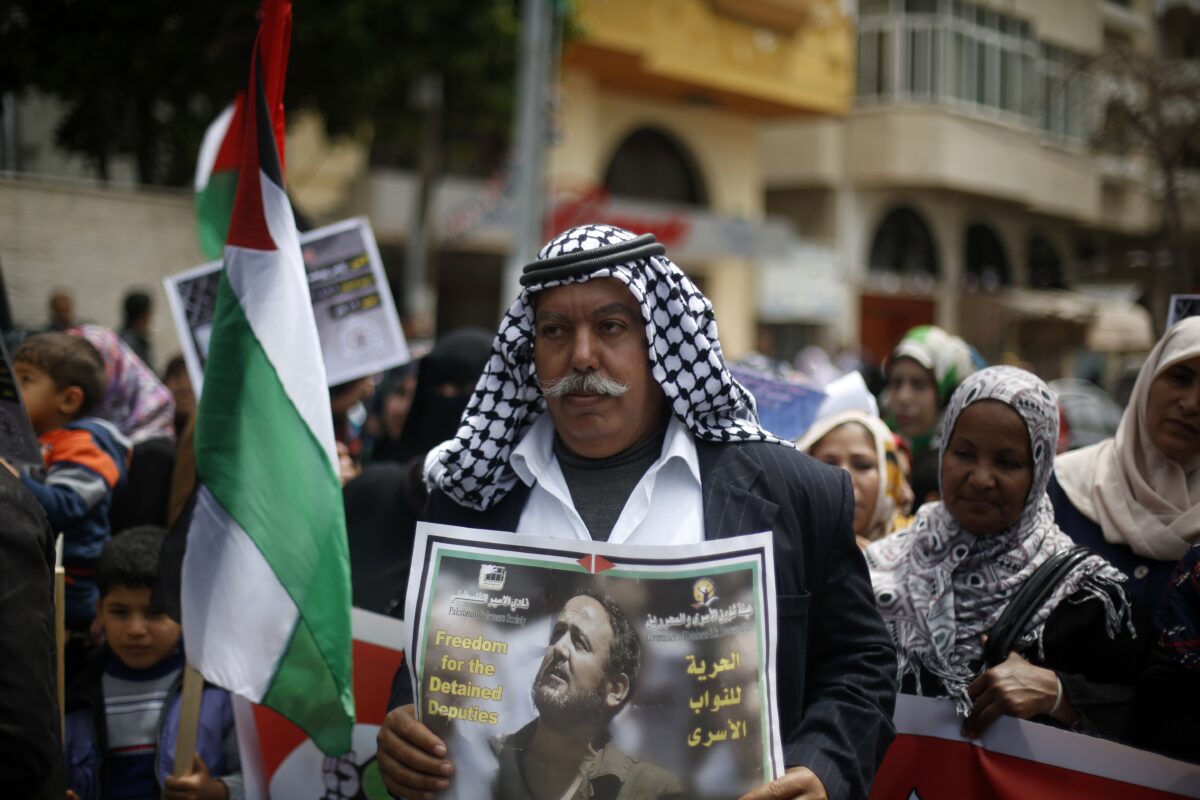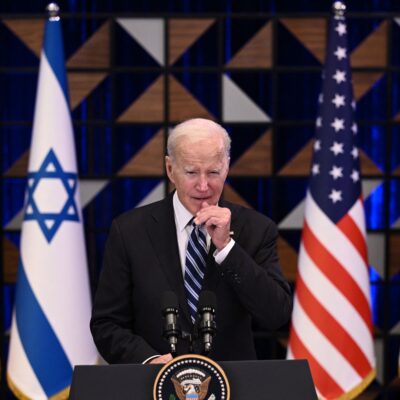Hamas push to release Palestinian terrorists a stumbling block in cease-fire negotiations
'We are speaking about prisoners who have spent a lot of time in Israeli jails, and about those who can really contribute to Hamas if they are released,' expert says

MOHAMMED ABED/AFP via Getty Images
A Palestinian man holds a portrait of Fatah leader Marwan Barghouti, who is imprisoned in an Israeli jail, during a protest marking Palestinian Prisoners' Day in Gaza City on April 16, 2015.
As U.S., Qatari and Egyptian teams work to mediate a cease-fire between Israel and Hamas ahead of the start of the Muslim holy month of Ramadan on March 10, one serious sticking point is likely to be the terror group’s demand that some of its most revered – and despised – members are released from Israeli jails in exchange for some of the 136 Israeli hostages who have been held in Gaza since the brutal Oct. 7 terror attacks.
According to information leaked from talks that took place in Paris, a possible formula proposed by the U.S. for releasing Palestinians imprisoned by Israel in exchange for the Israeli hostages will happen in two stages. In the first stage, Hamas will release all the women, the elderly, the sick and the wounded; later, the rest of the hostages – young men, soldiers and the bodies of those who died in captivity – will be released.
In exchange, Israel will release some 21 Palestinian prisoners for the seven remaining civilian women, and an additional 90 Palestinians, including 15 higher-profile terrorists, for five female soldiers. A further 90 Palestinian prisoners will be freed in exchange for 15 men over age 50, and 156 Palestinians for the 13 Israeli men believed to be sick or injured. In a final round, Palestinian prisoners rearrested after Israel freed them in the 2011 deal to return kidnapped Israeli soldier Gilad Shalit will be released.
It is still unclear, however, if the sides would accept this arrangement. Over the weekend, there were reports of Israel’s willingness, but Hamas was stalling in providing a clear list of which hostages it would release, including acknowledging who is still alive and who is dead.
In Israel, the debate around Palestinian prisoners, especially high-profile ones accused of carrying out some of the most heinous terror attacks on its soil, is volatile, underscoring the deep intractability of the Israeli-Palestinian conflict.
“Hamas is looking to get released some of the worst terrorists, those with a lot of Jewish blood on their hands,” Kobi Michael, a senior researcher at the Institute for National Security Studies (INSS) and the Misgav Institute for National Security and Zionist Strategy, told Jewish Insider in an interview.
Michael said that while most of the terrorists Hamas is seeking to release come from the group, they will also ask Israel to free terrorists from other Palestinian factions, including Fatah, “because they want to emphasize their national role and the idea that they are the only one who were able to release the Palestinian prisoners.”
“The issue of Palestinian prisoners has a very, very broad consensus among the Palestinian people,” he explained, adding, “It is almost a sacred value because for them, all the terrorists are considered national symbols, part of Palestinian heritage and they symbolize the national resistance against the occupiers.”
Because they are glorified by the Palestinian society, and by the Palestinian leadership, Michael said, “releasing them will give Hamas greater popularity and support among ordinary Palestinians.”
“This is the reason that they are insisting on it,” he continued. “They are willing and ready to pay a very high price to release the terrorists, including sacrificing civilians, women and children and the elderly, because these terrorists are considered to be much more important than the regular citizens.”
Among the terrorists that Hamas will likely seek to release are individuals such as Ibrahim Hamed, a former head of Hamas’ military wing in the West Bank, who is serving 45 life sentences for orchestrating several suicide attacks that killed dozens of Israelis during the Second Intifada, the armed Palestinian uprising in the early 2000s; Abbas al-Sayed, another former military commander from the West Bank, who was responsible for the 2001 Sharon shopping mall attack in which 35 Israelis were killed and hundreds wounded, and the 2002 Park Hotel bombing in Netanya, which left 30 people dead and 140 wounded; and Jamal Abu Hayjah, also serving multiple life sentences for his role in attacks against Israelis during the Second Intifada.
From other militant Palestinian factions, Hamas will likely try to free Ahmed Sa’adat, the former secretary-general of the Popular Front for the Liberation of Palestine (PFLP), who was behind the assassination of Israeli Tourism Minister Rehavam Ze’evi in 2001. The terror group may also push to release Marwan Barghouti, the most high-profile Palestinian security prisoner, who once led the paramilitary wing of Fatah, the party affiliated with Palestinian Authority President Mahmoud Abbas. Jailed in 2002 for his role in the Second Intifada, Barghouti is viewed by Palestinians as their version of Nelson Mandela, and is often touted as a future Palestinian national leader.
“I believe that Hamas will try to concentrate on those names because, first of all, they are symbols and it is very important for the movement to demonstrate achievements, and secondly, from a functional point of view, they can really contribute to the movement,” said Michael Milshtein, head of the Palestinian Studies Forum at the Dayan Center in Tel Aviv University.
“We are speaking about prisoners who have spent a lot of time in Israeli jails, and about those who can really contribute to Hamas if they are released,” he said, noting that “almost all of them are from the West Bank.”
Milshtein estimated that Hamas could demand that several hundred prisoners be released, with an emphasis on those released in the Shalit deal but rearrested by Israel. However, he said, they will refrain from requesting the release of hundreds of terrorists arrested recently for their involvement in the events on Oct. 7.
“Releasing any Palestinian terrorist is complicated for Israel,” Milshtein explained. “But it will be less complicated than releasing the Nukhba terrorists arrested for their part in the Oct. 7 massacre – that memory is still too fresh in Israelis minds.”
Milshtein, a retired IDF colonel who previously served as an adviser on Palestinian affairs to the head of army’s civil administration, COGAT, said that the probability of terrorists released in the forthcoming deal returning to activities in Hamas was high.
“On Oct.7 we realized that we didn’t understand the basic the ideological DNA of Hamas members, and if we think that those men, those terrorists, will retire and start a quiet personal life, then we still do not understand the basic DNA of Hamas,” he said, pointing to Hamas leader Yahya Sinwar, who was released as part of the Shalit deal and immediately resumed his terrorist activities, rising to the top of the Iranian-backed terror group and eventually masterminding the Oct. 7 attack.
Lt. Col. (res.) Meir Indor, chairman of the Almagor Terror Victims Association, told JI that based on previous experiences of similar prisoner exchange deals, it was almost certain that released Palestinian prisoners would return to their terror activities.
“Those who are going back into the business of terrorism can be divided into three groups,” he said, describing how there are those who go back and just talk about what happened to their immediate community; then there are the terrorists who give media interviews bragging about how they killed their victims; and the third group are those who “direct and sponsor big terrorist acts.”
Indor, whose group filed a legal petition in the Supreme Court last November aiming to block or at least delay the previous cease-fire deal in which 240 Palestinian prisoners were released in exchange for 105 kidnapped civilians, said that releasing Palestinians convicted of terror crimes in this way motivated them to carry out future attacks.
“Those who sign the current cease-fire deal, should put another paper beneath it that saying, ‘to the best of my knowledge, I am giving terrorists the right to kill other people,” he said.









